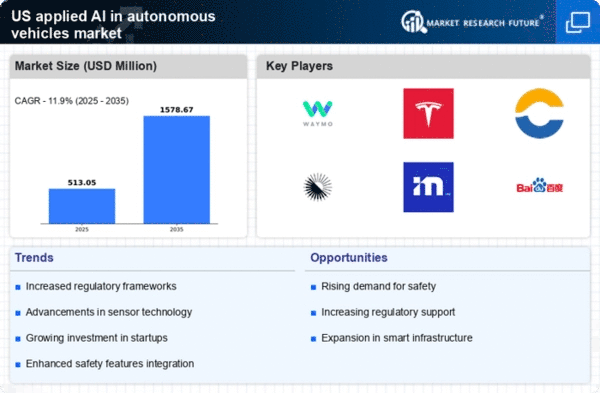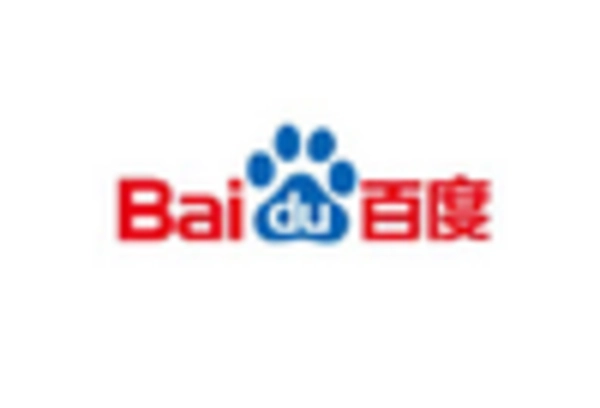Technological Advancements in AI
The applied ai-in-autonomous-vehicles market is experiencing rapid technological advancements, particularly in machine learning and computer vision. These innovations enhance the ability of vehicles to interpret their surroundings, leading to improved navigation and obstacle detection. For instance, the integration of deep learning algorithms has shown to increase the accuracy of object recognition by up to 95%. As these technologies evolve, they are likely to reduce the costs associated with autonomous vehicle development, making them more accessible to manufacturers. This trend is expected to drive investment in the applied ai-in-autonomous-vehicles market, as companies seek to leverage cutting-edge technologies to gain a competitive edge.
Government Initiatives and Funding
Government initiatives and funding play a pivotal role in shaping the applied ai-in-autonomous-vehicles market. Various federal and state programs are designed to support the development and testing of autonomous vehicles. For instance, the U.S. Department of Transportation has allocated over $100 million in grants to promote research in autonomous vehicle technology. These initiatives not only provide financial backing but also create a regulatory framework that facilitates the safe deployment of autonomous vehicles. As a result, government support is likely to enhance public confidence and stimulate growth in the applied ai-in-autonomous-vehicles market.
Investment from Major Automotive Players
Investment from major automotive players is a critical driver for the applied ai-in-autonomous-vehicles market. Leading companies are allocating substantial resources to research and development, aiming to enhance their autonomous vehicle offerings. For example, in 2025, it is estimated that investments in autonomous vehicle technology will exceed $50 billion. This influx of capital not only accelerates technological advancements but also encourages collaboration between automotive manufacturers and tech firms. Such partnerships are likely to yield innovative solutions that further propel the applied ai-in-autonomous-vehicles market forward.
Consumer Demand for Enhanced Mobility Options
Consumer demand for enhanced mobility options is increasingly influencing the applied ai-in-autonomous-vehicles market. As urban populations grow, individuals seek alternatives to traditional transportation methods. Surveys indicate that approximately 60% of consumers express interest in using autonomous vehicles for daily commutes. This shift in consumer preferences is prompting manufacturers to prioritize the development of user-friendly autonomous solutions. Consequently, the applied ai-in-autonomous-vehicles market is expected to expand as companies respond to this demand by offering innovative and convenient mobility solutions.
Growing Demand for Smart Transportation Solutions
There is a notable increase in demand for smart transportation solutions within the applied ai-in-autonomous-vehicles market. Urbanization and population growth have led to traffic congestion and environmental concerns, prompting cities to explore innovative mobility solutions. According to recent studies, the market for smart transportation is projected to reach $200 billion by 2026, with a significant portion attributed to autonomous vehicles. This growing demand encourages investment in infrastructure and technology that supports the deployment of autonomous vehicles, thereby fostering growth in the applied ai-in-autonomous-vehicles market.

















